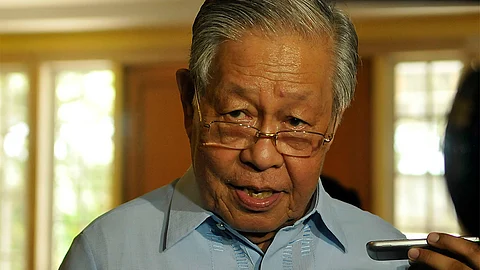

RETIRED Chief Justice Hilario Davide Jr. warned on Monday, February 5, 2024, of “more disturbing and serious problems and consequences” if the economic provisions of the 1987 Constitution are amended.
During the Senate subcommittee deliberation on Resolution of Both Houses 6 (RBH6), Davide, who was among the 50 members of the Philippine Constitutional Commission of 1986, raised the need for the full implementation of the principles and state policies of the Constitution.
“Our problems are not due to the restrictive economic provisions of the Constitution. They cannot be solved by removing these restrictive economic provisions and completely leaving to Congress the future under the clause ‘unless otherwise provided by law.’ On the contrary, they would create more serious and disturbing problems and consequences,” he added.
The RBH6 seeks to amend Articles 12, 14 and 16 or the provision on public services, education and advertising industry of the 1987 Constitution by adding the phrase "unless otherwise provided by law."
In making such amendments, Davide said the country would only open its educational system to foreign control and dominance, which is delicate, noting that basic education is the most crucial to the development of the youth.
He noted that under the Constitution, schools are mandated to impart learnings on patriotism and nationalism among Filipino youths, which is likely will not happen if foreigners will intervene or take over.
“For instance, if a Chinese educational entity would now come in, do you expect it to be faithful enough to comply with these mandates? Would not its teachings focus on Chinese philosophy or even on the life of Mao Zedong?” he added.
Davide maintains that he is strongly not in favor of constitutional amendment.
“It would be a cha-cha dance to the grave or to hell. It would be a cruel punishment for a God-loving, patriotic, and nationalistic people. It would be claiming our people to foreign domination or control. God forbid that we now amend our Constitution,” he added.
For his part, former Supreme Court Associate Justice Vicente Mendoza said both chambers of Congress should convene as constituent assembly to discuss the proposed amendments to the Constitution as mandated under Article 17 but will have to vote separately later on.
“When they act as an Assembly, they do not act as Senators or members of the House. Therefore, I submit that this body (Senate) is not a Constituent Assembly nor part of a Constituent Assembly. To become a Constituent Assembly, the two houses must first sit together, then pass a Resolution to become Constituent Assembly,” Mendoza said.
“It is only then that the Constituent Assembly under Article 17 Section 1 Paragraph 1 (of the Constitution) can be contemplated. Otherwise, no,” he added.
Discussions on constitutional amendments came into the spotlight anew amid the push for People’s Initiative (PI) for Charter change.
The PI seeks to amend Article 17, Section 1 of the Constitution to allow all members of Congress to jointly vote on proposed constitutional amendments in a constituent assembly.
It did not sit well for the members of the upper chamber of Congress since it would mean that the Senate and its 24 members cannot cast any meaningful vote against the 316 members of the House of Representatives.
The Senate unanimously signed a manifesto rejecting the PI for Cha-cha, which the chamber tagged as a “brazen attempt to violate the Constitution, the country and our people.”
House Speaker Martin Romualdez was tagged as the brains behind the PI and the controversial signature drive related to it.
As claimed by several senators, including his cousin, Senator Imee Marcos, Romualdez allegedly offered P20 million per legislative district in exchange for signatures. He has repeatedly denied such a claim.
Meanwhile, Senator Robin Padilla filed Resolution of Both Houses 7, which seeks to amend Section 1 of Article XVII (Amendments or Revisions) in the Constitution to have both houses of Congress voting separately.
"There is a need to amend the aforementioned provision in order to be consistent with the intention of the framers of the Constitution to adopt a bicameral legislature and to leave no room for interpretation as to the manner of voting which over the years have caused disputes among both the Senate and House of Representatives," he said.
"Kasi hindi matatapos ito, legal question ito. Pati judiciary, maraming comments. Kung ang comments ma-absorb nating lahat ang gulo gulo na. Kaya pwede sana magkaroon tayo ng itong Congress na ito ang 19th Congress matapos ang usaping ito at magkaroon ng finality kung ano ang nasa Art 17 Sec 1 na yan (This is a never-ending legal issue. Even in the judiciary, several comments have been made. If we just absorb those comments, we'll get confused. So I hope the 19th Congress will address this with finality)," he added. (TPM/SunStar Philippines)